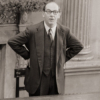Isaiah Berlin

Isaiah Berlin
Sir Isaiah Berlin OM CBE FBAwas a Russian-British social and political theorist, philosopher and historian of ideas. He was an essayist, conversationalist, raconteur, and lecturer. In its obituary of the scholar, the Independent stated that "Isaiah Berlin was often described, especially in his old age, by means of superlatives: the world's greatest talker, the century's most inspired reader, one of the finest minds of our time... there is no doubt that he showed in more than one direction the unexpectedly...
NationalityRussian
ProfessionPhilosopher
Date of Birth6 June 1909
CountryRussian Federation
Churchill for all his love of the present hour, his unquenchable appetite for new knowledge, his sense of the technological possibilities of our time, and the restless roaming of his fancy in considering how they might be most imaginatively applied, despite his enthusiasm for Basic English, or the siren suit which so upset his hosts in Moscow - despite all this, Churchill remains a European of the nineteenth century.
For all his sense of history, his large, untroubled, easy-going style of life, his unshakable feeling of personal security, his natural assumption of being at home in the great world far beyond the confines of his own country, Roosevelt was a typical child of the twentieth century and of the New World.
The simple point which I am concerned to make is that where ultimate values are irreconcilable, clear-cut solutions cannot, in principle, be found. To decide rationally in such situations is to decide in the light of general ideals, the overall pattern of life pursued by a man or a group or a society.
There exists a great chasm between those, on one side, who relate everything to a single central vision... and, on the other side, those who pursue many ends, often unrelated and even contradictory... The first kind of intellectual and artistic personality belongs to the hedgehogs, the second to the foxes.
But to manipulate men, to propel them toward goals which you-the social reformers-see, but they may not, is to deny their human essence, to treat them as objects without wills of their own, and therefore to degrade them.
Those who have ever valued liberty for its own sake believed that to be free to choose, and not to be chosen for, is an unalienable ingredient in what makes human beings human.
Few things have done more harm than the belief on the part of individuals or groups (or tribes or states or nations or churches) that he or she or they are in sole possession of the truth: especially about how to live, what to be and do - and that those who differ from them are not merely mistaken, but wicked or mad: and need restraining or suppressing.
Liberty and equality, spontaneity and security, happiness and knowledge, mercy and justice - all these are ultimate human values, sought for themselves alone; yet when they are incompatible, they cannot all be attained, choices must be made, sometimes tragic losses accepted in the pursuit of some preferred ultimate end.
Injustice, poverty, slavery, ignorance - these may be cured by reform or revolution. But men do not live only by fighting evils. They live by positive goals, individual and collective, a vast variety of them, seldom predictable, at times incompatible.
Freedom for the wolves has often meant death to the sheep.
If, as I believe, the ends of men are many, and not all of them are in principle compatible with each other, then the possibility of conflict—and of tragedy—can never wholly be eliminated from human life, either personal or social. The necessity of choosing between absolute claims is then an inescapable characteristic of the human condition. This gives its value to freedom as Acton conceived of it—as an end in itself, and not as a temporary need, arising out of our confused notions and irrational and disordered lives, a predicament which a panacea could one day put right
All forms of tampering with human beings, getting at them, shaping them against their will to your own pattern, all thought control and conditioning is, therefore, a denial of that in men which makes them men and their values ultimate.
Out of the crooked timber of humanity, nothing completely straight was ever made
Both liberty and equality are among the primary goals pursued by human beings throughout many centuries; but total liberty for wolves is death to the lambs, total liberty of the powerful, the gifted, is not compatible with the rights to a decent existence of the weak and the less gifted.